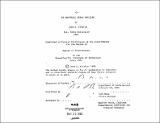An adaptable urban dwelling
Author(s)
Winslow, John Arthur
DownloadFull printable version (12.41Mb)
Other Contributors
Massachusetts Institute of Technology. Department of Architecture.
Advisor
Jack Myer.
Terms of use
Metadata
Show full item recordAbstract
Adaptability in this Thesis refers to the inherent capacity of a dwelling, to accommodate changing spatial and economic requirements over time. The adaptable dwelling is intended to respond to change as a fundamental condition of the human life-cycle, and offers choices to its inhabitants when changes occur. The adaptable dwelling is intended to provide an alternative to either moving as a result of change or to tolerating a space/need mis-match. Adaptability inevitably requires some overprovision of space and/or services within the dwelling which, in turn, requires increased expenditures. Thus, a major obstacle to providing adaptable housing - quite aside from strictly architectural concerns - is an economic one. A major contention of this Thesis is that adaptability will be realized only when it is built within an economic framework that will support/justify the necessary overprovision of space and/or services. The proposed economic framework in this Thesis is based on the notion of income-generation. The dwelling is conceived as a collection of areas that the inhabitants can combine - and continuously recombine - in a variety of ways such that the inhabitants can rent to others those areas which they do not need for themselves at any given time. In this way, overprovided space and/or services can generate operating income for the inhabitant which can offset the additional expenditures required for adaptability. The architectural intent of this Thesis is to design prototypical adaptable dwellings based on these social and economic notions. The adaptable dwelling is designed to function usefully as a residence for one, two or three families - at the option of the controlling inhabitant. A dwelling conceived and designed in this manner has a significant potential for adaptability within a supportive economic framework.
Description
Thesis (M. Arch.)--Massachusetts Institute of Technology, Dept. of Architecture, 1980. MICROFICHE COPY AVAILABLE IN ARCHIVES AND ROTCH. Includes bibliographical references.
Date issued
1980Department
Massachusetts Institute of Technology. Department of ArchitecturePublisher
Massachusetts Institute of Technology
Keywords
Architecture.